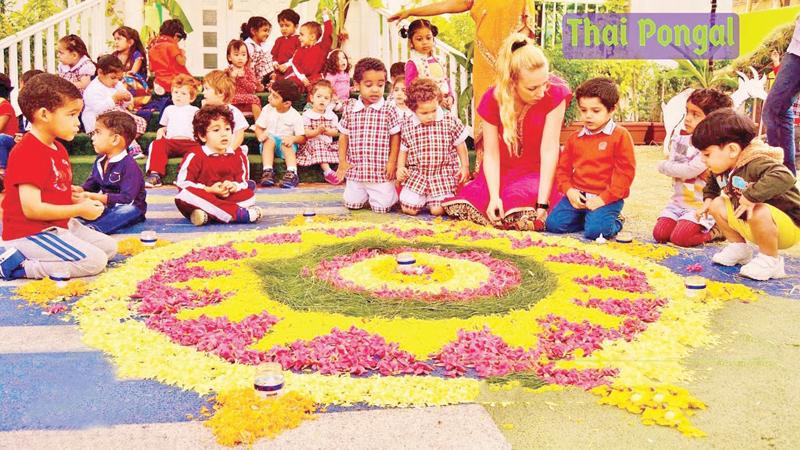
Thai Pongal is a traditional harvest festival observed by all Tamils, Hindus and non-Hindus. It is celebrated in India, Sri Lanka and in other parts of the world where there are Tamil communities. It falls in the month of Thai in the Tamil calendar (The tenth month in the Tamil calendar) and is held to thank the Sun God, Earth, the Rain God , other natural elements and the cattle for a good harvest. Thai Pongal is the Tamil equivalent of the American/Christian tradition of Thanksgiving and falls between January 12 and 13 in the Christian calendar.
 ‘Pongal' literally means boiling over. Sweet Pongal rice is offered to the Sun God during the Thai Pongal festival.
‘Pongal' literally means boiling over. Sweet Pongal rice is offered to the Sun God during the Thai Pongal festival.
Thai Pongal is the only Hindu festival which follows a solar calendar (the days are fixed by the movement of the Sun) and is celebrated in mid-January each year. Pongal is also astrologically important as it marks the start of the Sun’s journey northwards from its southernmost point. This is known as the Uttharayana and is considered an auspicious time. Dakshinayana is the Sun’s journey from its northernmost point southwards and this is considered inauspicious.
Bhogi
Bhogi is the first day of the four days of Thai Pongal and is the day before Thai Pongal. In preparation for the festival, homes are painted and washed, new curtains are hung and people make or buy new clothes. All preparations for the next day’s pooja are completed such as decorations with banana and mango leaves, garlands of flowers, banana trees with bunches of bananas and kolam and rangoli patterns.
Thai Pongal Festival
On the Thai Pongal day the womenfolk get up before dawn and draw new kolam/rangoli in front of the house. Then the families dress in their Sunday best and get ready for the cooking of the Pongal. This has to be done outdoors in the garden, a courtyard or a porch. The hearth is of three bricks or stones. An elder of the family will supervise the cooking. A colourfully decorated clay pot will be used to cook the Pongal. Rice, milk, green gram (mung) jaggery, spices, cadjunuts, raisins and other ingredients are used to prepare this sweet concoction. When the rice starts to boil a horn called the Sanggu will be blown and the spectators will cry out Pongalo, meaning the pot is overflowing. They will also chant Thai pirandhal vazi pirrakum meaning the beginning of the month of Thai makes way for new opportunities. The first offering is to Surya or the Sun God. Fruits such as mangoes and bananas are served with Pongal rice.Then the family members will eat using banana leaves for plates and will share their Pongal with relatives, friends and neighbours.
Maatu Pongal
 Maattu Pongal is celebrated the day after Thai Pongal. On this day the farmers honour their cattle by showing their gratitude. (Mattu means bull in Tamil) The animals are bathed and the horns are polished, decorated with flowers and capped with shiny metal. Cows are decorated with manjalthanni (turmeric water) and kumkum applied on their foreheads. People also garland their cattle and feed them with venn pongal, fruit, jaggery and honey.
Maattu Pongal is celebrated the day after Thai Pongal. On this day the farmers honour their cattle by showing their gratitude. (Mattu means bull in Tamil) The animals are bathed and the horns are polished, decorated with flowers and capped with shiny metal. Cows are decorated with manjalthanni (turmeric water) and kumkum applied on their foreheads. People also garland their cattle and feed them with venn pongal, fruit, jaggery and honey.
Girls and women feed the birds and pray for their brothers for the bonds between them to be strengthened.
They offer a kaka pidi, kanu pidi feast to the crows which consists of coloured rice, cooked vegetables, fruit and sweet pongal and pray that the bonds between them and their brothers will be as strong as that among crows.
In the evening people pray to Lord Ganesh. Some people light coconut palm frond torches, take it thrice around the cattle and run to the edge of the village and drop the torch. This is believed to ward off the jealous evil eye on the cattle.
Jaliikattu or Manji Virattu is a game played in Tamil Nadu on Maatu Pongal or Kaanum Pongal. Money is tied to the horns of bulls and young men chase, catch and tame these ferocious bulls and take the money.
Kaanum Pongal
 This is the fourth and last day of the Thai Pongal. Elders bless the young and people visit each other and exchange gifts.
This is the fourth and last day of the Thai Pongal. Elders bless the young and people visit each other and exchange gifts.
Sri Lankans generally celebrate Thai Pongal on two days with the Pongal being cooked on the first day.
Kolam
Kolam are drawings done with rice flour, chalk or chalk powder or rock powder or synthetically or naturally coloured powder. Kolams are geometrical patterns of curves or loops around a grid pattern of dots. It is done in Sri Lanka,Tamil Nadu, Andra Pradesh, Karnataka, some parts of Goa and some other Indian States .
It is also done in Malaysia and some other Asian countries. Kolams are drawn on festive occasions while some people do it daily. They are believed to bring good luck.
One month before Thai Pongal women draw kolam and as it is drawn with coarse rice flour it is an invitation to the birds and other small creatures to eat.
It is symbolic of all being welcome at Thai Pongal. Rangoli is a similar art form that originated in India.
